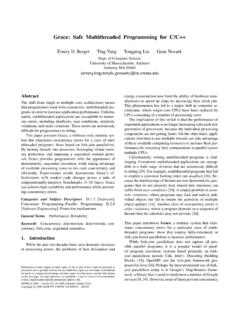Transcription of WHAT IS GRACE - interpreting scriptures
1 what Is GRACE (Your questions and comments are welcome) (Bold type and underling in scripture text have been added for emphasis) The word GRACE is the English translation of the Greed work charis . Charis is defined in Strong s Exhaustive Concordance Of The Bible as graciousness (as gratifying) of manner or act (abstr., or concr.; lit., fig. or spiritual; espec. the divine influence on the heart, and its reflection in the life;.. ). In scripture there are several applications of the word charis having varied English translations. These applications and translations provide insight into the essential meaning of the word.
2 The word charis is translated liberality at 1 Corinthians 16 1 Now concerning the collection for the saints, as I have given order to the churches of Galatia, even so do ye. 2 Upon the first day of the week let every one of you lay by him in store, as God hath prospered him, that there be no gatherings when I come. 3 And when I come, whomsoever ye shall approve by your letters, them will I send to bring your liberality unto Jerusalem. Here, GRACE is applied to the material collection given by the brethren at Corinth to those brethren in Jerusalem. It is noteworthy that the giving from one person to another is GRACE .
3 The application of GRACE as passing from one person to another is also seen in Paul s epistle to the church at Corinth where Paul refers to GRACE as a benefit : 2 Corinthians 1 15 And in this confidence I was minded to come unto you before, that ye might have a second benefit; This translation of the word GRACE is referring to spiritual benefit that the Corinthian brethren might derive from Paul s being with them. Again, for reference to GRACE in the most common application, as giving between persons, we will look at two passages in the book of Acts. The context of the passages relate to the imprisonment of Paul at Caesarea.
4 Here the Greek word charis is translated pleasure : Acts 24 27 But after two years Porcius Festus came into Felix' room: and Felix, willing to shew the Jews a pleasure, left Paul bound. Acts 25 1 Now when Festus was come into the province, after three days he ascended from Caesarea to Jerusalem. 2 Then the high priest and the chief of the Jews informed him against Paul, and besought him, 3 And desired favour against him, that he would send for him to Jerusalem, laying wait in the way to kill him. 4 But Festus answered, that Paul should be kept at Caesarea, and that he himself would depart shortly thither.
5 5 Let them therefore, said he, which among you are able, go down with me, and accuse this man, if there be any wickedness in him. 6 And when he had tarried among them more than ten days, he went down unto Caesarea; and the next day sitting on the judgment seat commanded Paul to be brought. 7 And when he was come, the Jews which came down from Jerusalem stood round about, and laid many and grievous complaints against Paul, which they could not prove. 8 While he answered for himself, Neither against the law of the Jews, neither against the temple, nor yet against Caesar, have I offended any thing at all.
6 9 But Festus, willing to do the Jews a pleasure, answered Paul, and said, Wilt thou go up to Jerusalem, and there be judged of these things before me? We see that when Felix left Paul bound, and when Festus asked Paul to go up to Jerusalem to be judged, simply to please the Jews, both actions were a matter of GRACE toward the Jews. In its most elemental form, GRACE is the providing of a gratuity, real or perceived, from a person or persons to another person or persons. Further, the benefit may be tangible or intangible and provide for actual need or selfish desire.
7 Now we will move our discussion from GRACE in its most basic form, which is a gratuity bestowed by a benefactor on a beneficiary, to a discussion of GRACE wherein God is the source. While the basic form is the same, the content is according to divine prerogative. God Himself has determined the purposes for which GRACE will be granted. God s GRACE for man is expressed in the following scriptures : Hebrews 2 9 But we see Jesus, who was made a little lower than the angels for the suffering of death, crowned with glory and honour; that he by the GRACE of God should taste death for every man.
8 Ephesians 2 4 But God, who is rich in mercy, for his great love wherewith he loved us, 5 Even when we were dead in sins, hath quickened us together with Christ, (by GRACE ye are saved;) 2 Corinthians 1 12 For our rejoicing is this, the testimony of our conscience, that in simplicity and godly sincerity, not with fleshly wisdom, but by the GRACE of God, we have had our conversation in the world, and more abundantly to you-ward These scriptures inform us that: by God s GRACE Christ died for us; by God s GRACE we are made alive (saved); and by God s GRACE we live our life in this world.
9 Accordingly, a clear and accurate understanding of the meaning of the word GRACE as used in the scriptures , and more particularly, of God s GRACE , and on what basis God will bestow his GRACE , is essential to one s relationship to God. Other English translations of the word charis are thank and thankworthy . In the Gospel of Luke charis is translated thank . We read at Luke 6 32 For if ye love them which love you, what thank have ye? for sinners also love those that love them. 33 And if ye do good to them which do good to you, what thank have ye? for sinners also do even the same.
10 34 And if ye lend to them of whom ye hope to receive, what thank have ye? for sinners also lend to sinners, to receive as much again. 35 But love ye your enemies, and do good, and lend, hoping for nothing again; and your reward shall be great, and ye shall be the children of the Highest: for he is kind unto the unthankful and to the evil. When we receive back commensurate with what we give, the net result is that it costs us nothing. However, it is a matter of GRACE to bestow benefit when it is a sacrifice by us, and God regards such giving. (See Luke 21:1-4 for an example) In 1 Peter where charis is translated, both, thankworthy and acceptable , we read: 1 Peter 2 19 For this is thankworthy, if a man for conscience toward God endure grief, suffering wrongfully.












